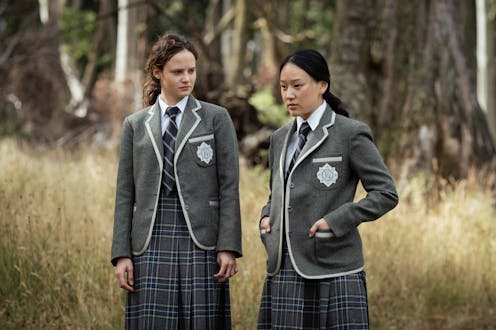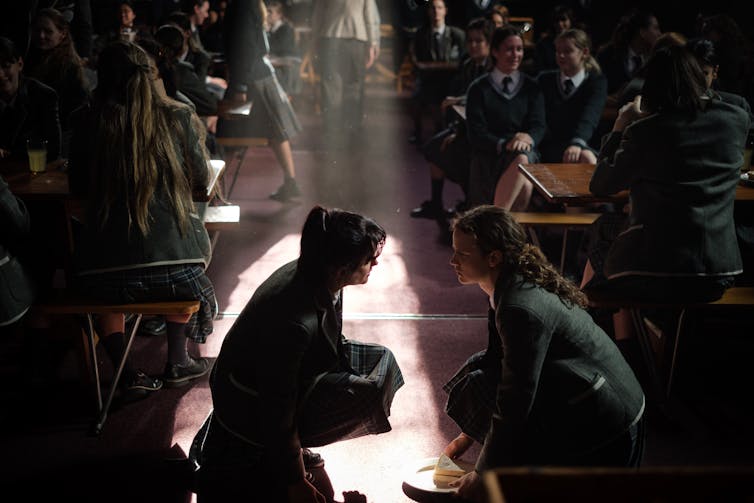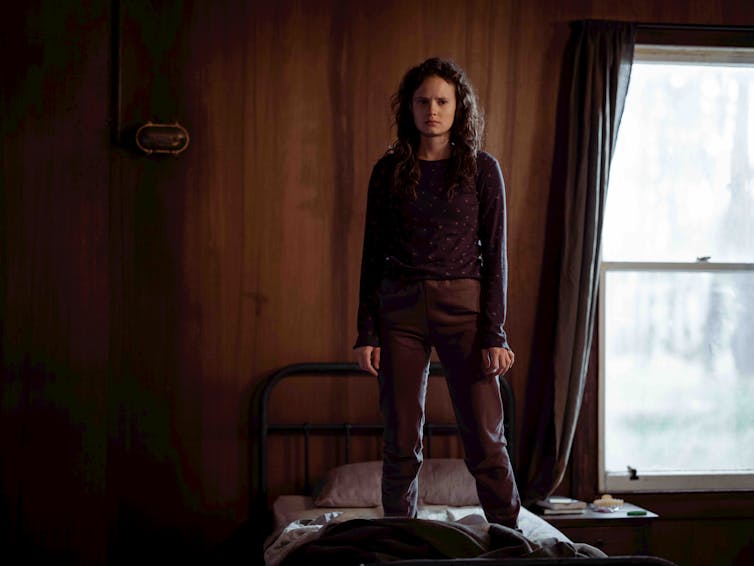
Review: Bad Behaviour, directed by Corrie Chen.
Bad Behaviour is a gritty, intense psychological drama that follows the haunting teenage experience of now 20-something Joanna Mackenzie (Jana McKinnon), who revisits the year she spent on scholarship at Silver Creek.
The exclusive girls’ boarding school, in the remote Australian wilderness, fosters independence, strength and resilience through survivalism and marathon training.
With teachers located off campus, the quiet, sensitive Jo soon finds herself in an environment more Lord of the Flies than kumbaya.
Jo and her classmates are tormented by charismatic bully Portia (Markella Kavenagh). Soon finding herself in the favour of the cruel and unpredictable Portia, the two begin a highly charged, intimate friendship. Jo experiences the first inklings of her queer sexual awakening.
When Portia suddenly moves on to a new bestie, Jo, now on the outer, never recovers from the rejection.
Driving the story is the mystery of Jo’s role in the suffering of Alice Kang (Yerin Ha), a fellow scholarship student.
Alice is the target of relentless and severe bullying. The first episode opens with her in tears, setting herself alight. Flash forward to the present where she is a successful cellist performing at the concert hall where Jo works as a cleaner and cocktail waiter.
Jo’s surprise meeting with Alice is the catalyst for her distressing mental revisitation of Silver Creek.
Complex girlhood
Bad Behaviour, based on Rebecca Starford’s memoir of the same name, shows a disturbing side to teenage girlhood we don’t often see represented in such a brutal, truthful way. A melting pot of sex, power, manipulation and cruelty, this story runs counter to dominant tropes of girlhood such as sweetness, naivety and innocence.
Figures of complex girlhood have become more widely represented on screen in recent years: think of Anya Taylor-Joy’s Thomasin in The Witch; Katherine Langford as Miki in Savage River; and Antonia Gentry’s Ginny of Ginny & Georgia.
These characters go beyond the often maligned “strong female character” who sometimes simply resembles a male hero archetype with a female body (think Katniss Everdeen).

Instead, Jo and other complex feminine characters are intriguing for their contradictions, flaws, vulnerabilities and psychological depth.
Jo is not easily “likeable”: she is unemotional, participates in bullying, and is unkind to her adoring non-binary housemate Saskia (Daya Czepanski), having sex with them and then discarding them.
A troubled psychology is revealed piece by piece over four episodes.
These kinds of female protagonists tell more varied and diverse narratives of femininity.
Complicated queer narratives
At the heart of this series is the spectre of abuse and long-term effects of trauma on victims. Queer experiences of intimate partner abuse, including coercive control, have been largely invisible in the popular imagination.
Representations of abusive heterosexual relationships are not uncommon, even if they often draw on inaccurate stereotypes that warp public perception of how such dynamics play out in reality.
Queer narratives of intimate partner violence and abuse are rare, with dire consequences on real lives. A 2015 Australian Institute of Family Studies report found:
there has been an invisibility of LGBTIQ relationships in policy and practice responses and a lack of acknowledgement that intimate partner violence exists in these communities.
This makes such dynamics difficult to detect, a problem taken up by Carmen Maria Machado in her memoir about struggling to make sense of an abusive relationship with a “charismatic and volatile” woman. Machado argues heteronormative definitions of partner abuse equate masculinity with violence and femininity with passivity, making it difficult to recognise “queer abusers and the queer abused”.
Bad Behaviour works against this cultural blind spot. It fills in detail and unpacks dynamics of power and control in the relationship between Jo and Portia as teenagers, and later when they meet up as young adults who are both “out”.
To adults, Portia’s behaviour looks like bullying, misbehaviour or cliquey exclusion. The drastic change in the victimised Jo, who becomes increasingly withdrawn and aggressive, looks like disobedience and a bad attitude.
But there is something much more sinister at play.

The sexually charged nature of some of the abuse is unmissable. In one scene, Portia corrals her cronies into helping her ambush Jo. They lift her by her underwear so she is left bleeding and bruised.
Bad Behaviour shows Portia motivated by the power and control she has over others. She takes pleasure in being able to control their emotions through giving her attention and enacting public and private cruelties on her victims.
If she is difficult to identify as a domestic abuser, Jo is even more difficult to identify as a victim.
Read more: Beyond gender: LGBTIQ abuse shows it’s time to shift the debate on partner violence
The myth of the perfect victim plagues real and fictional narratives about victimhood. Jo doesn’t recognise herself as a victim, having internalised perspectives of onlookers she is “bad”, “weak” or “trouble”.
Jo is closed off from her emotions. She keeps going back to Portia, craving her affection even as an adult. She manipulates others using the same techniques she learned from Portia, continuing the cyclical nature of abuse.
But the fact is real victims are imperfect, and they are more likely to resemble Jo than Gabby Petito.
This limited series is an absolute must-watch, offering performances that crackle with tense chemistry, eerie and beautiful landscapes, and a revolutionary story of control, abuse and girlhood.
Bad Behaviour is on Stan now.
Emma Maguire does not work for, consult, own shares in or receive funding from any company or organisation that would benefit from this article, and has disclosed no relevant affiliations beyond their academic appointment.
This article was originally published on The Conversation. Read the original article.







